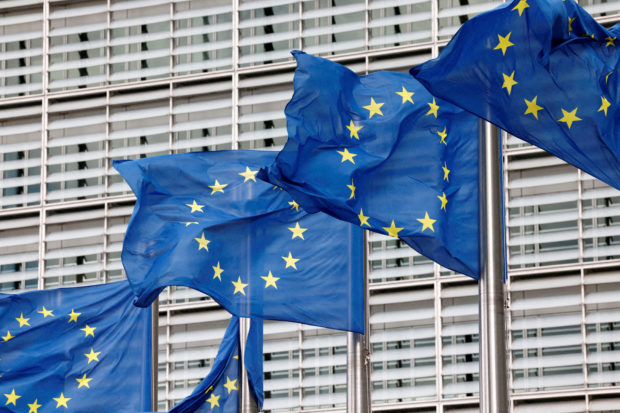
FILE PHOTO: European Union flags flutter outside the EU Commission headquarters in Brussels, Belgium, September 28, 2022. REUTERS/Yves Herman
MANILA — The European Union (EU) will continue recognizing the certificates of Filipino seafarers, noting its “constructive cooperation” with Philippine authorities in upgrading the maritime workers’ training program and accreditation system.
In February last year, the EU urged the Philippines to improve its efforts to comply with the Standards of Training, Certification, and Watchkeeping for Seafarers Convention, dangling a threat to withdraw recognition of Filipino seafarers’ qualifications in EU flag-carrying vessels if it finds that the concerns it raised years ago remain unresolved.
The Department of Migrant Workers said the country had not been able to pass the European Maritime Safety Agency’s (Emsa) evaluation since 2006.
“Since then, the Philippines has made serious efforts to comply with the requirements, in particular in key areas like the monitoring, supervision, and evaluation of training and assessment,” the European Commission said in a statement Friday.
EU Commissioner for Mobility and Transport Adina Vălean said they “appreciate the constructive cooperation with the Philippine authorities and welcome their efforts to improve the system for training and certifying seafarers.”
She pointed out that the Philippines provides a “significant and valued part” of the European and global shipping industry’s maritime workforce with some 50,000 Filipino seafarers currently working on ships carrying EU flag.
“The Philippines can count on our technical support to further improve the implementation and oversight of minimum education, training, and certification requirements, as well as living and working conditions,” Vălean added.
The European Commission said it aims to extend technical assistance to the Philippines to improve the country’s system for seafarer education, training, and certification.
It cited the discussion between EU President Ursula von der Leyen and Philippine President Ferdinand Marcos Jr. on the sidelines of the Association of Southeast Asian Nations-EU Summit in Brussels, Belgium last December.
Marcos had said then that he was able to get the commitment of several leading shipowners in Europe to “help [the] country hurdle some of the challenges in seafarers’ Emsa through the creation of an advisory council composed of concerned government agencies, international and local ship owners, and other stakeholders.”

Leave A Comment